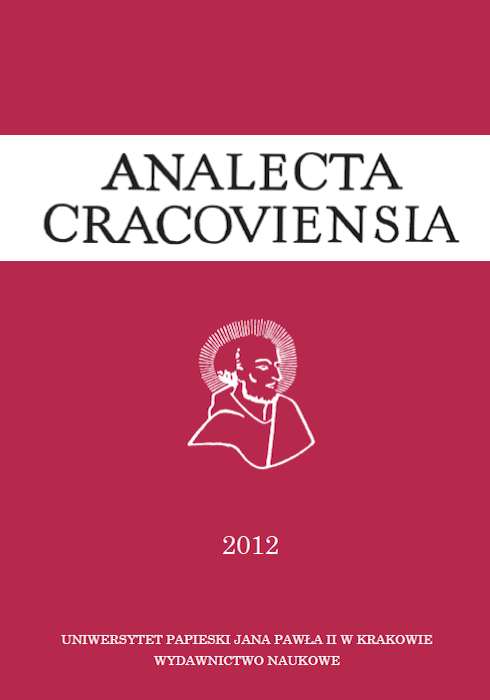Miłosierdzie jako synonim zbawienia w Koranie. Refleksje lingwistyczno-teologiczne
DOI:
https://doi.org/10.15633/acr.12Słowa kluczowe:
Allah, Divine mercy, Islam, Quran, salvationAbstrakt
There is the idea of divine mercy in Quran. It is expressed by the words of Arabic vocabulary derivated from the triliteral verbal root رحم rḥm. The fundamental means of expressing the mystery of divine mercy is the ritual formula it`s name Basmalah بسْمِ لِله ا ﺮﻟَّحْﻤَانِِ ا ﺮﻟَّحِﻴمِ bi-smi l-Lāhi r-Raḥmāni r-raḥími – „In the Name of Allāh, the Most Gracious, the Most Merciful”. ʼAr-Raḥmānu ( أ ﺮﻟَّحْﻤٰﻦُ ) and ʼAr-Raḥímu ( ا ﺮﻟَّحِﻴمِ ) are two names derived from ʼAr-Raḥmatu ( رَحْﻤَﺔ ) – „the mercy”, but more meanings that pertain to mercy than ʼAr-Raḥímu. This formula means the belonging to a community of Islam believers. Another formula is إنَّ لُله غَ ﻮﻔرٌ رَحِﻴمٌ ʼinna l-Lāhu ġafūrun raḥīmun – „Verily, Allāh his Oft-Forgiving, Most Merciful!” (S. V, 34. 39; IX, 9. 99. 102; XLIX, 14; LXXIII, 28) and its modifications. It`s used to confirm the credibility of the truths of faith and the moral norms divinely revealed. The divine revelation in Quran and its realisation in earthly life is signified with the followings pairs of derivatives of root رحم rḥm: هُﺪَﻯ ﻭرَحْﻤَﺔ )ﻭ ) (wa)-hudà wa-raḥmatun – „(and) a guidance and a mercy” (S. VI, 157; VII, 52; XVI, 64; XXVII, 76–77; XXXI, 2– إﻣَاﻡٌ ﻭرَحْﻤَﺔ ,( 3 ʼimāmun wa-raḥmatun – „a guide and a mercy” (S. XLVI, شِﻔاءٌ ﻭرَحْﻤَﺔ , 12 šifāʼun wa-raḥmatun – „a cure and a mercy” (S. XVII, ﻣَغْﻔِﺮَﺓ ﻣِﻦَ لِله ﻭرَحْﻤَﺔ ,( 82 maġfiratun mina l-Lāhi wa-raḥmatun – „forgiveness and mercy from Allāh” (S. III, فضْلُ الِله ﻭرَحْﻤَتُﻪُ ,( 157 faḏlu l-Lāhi wa-raḥmatuhu – „the grace and mercy of Allāh” (S. IV, صَ ﻮﻠَاﺕٌ ﻣِﻦْ رَبِّﻬمْ ﻭرَحْ ﺔﻤ ,( 83 ṣalawātun min rabbihim wa-raḥmatun – „who are blessed from their Lord and receive His mercy” (S. II, 157). Allāh, the Most Merciful, is absolutely independent in giving salvation. It is signified with phrase ﻣَﻦْ ﻳَﺸَاءُ man yašāʼu – „whom He wills” (S. II, 105). Divine mercy is better ( خَﻴْﺮٌ ẖayrun) from all, what man has on earth. Therefore in Quran there are more prayers for divine mercy and to divine mercy. Complementary to words derivated from the root رحم rḥm are the derivatives from the root رأف rʼf. In spite of more similiarity to biblical science about divine mercy, the author of Quran created own divine mercy conception. He throws away all of trinitology, christology, soteriology and staurology.
Pobrania
Opublikowane
Numer
Dział
Licencja
Prawa autorskie (c) 2012 Marek Micherdziński

Praca jest udostępniana na licencji Creative Commons Attribution-NonCommercial-NoDerivatives 3.0 Unported License.
Obecnie autorzy publikujący w czasopiśmie udzielają jego wydawcy zgody o następującej treści:
- Autor zachowuje autorskie prawa majątkowe do utworu, a jednocześnie udziela wydawcy czasopisma zgody na jego pierwszą publikację w wersji drukowanej i wersji online na licencji Creative Commons Uznanie autorstwa 4.0 Międzynarodowe oraz zgody na wykonywanie opracowań, w tym przekładów.
- Autor ma możliwość udzielania zgody niewyłącznej na opublikowanie utworu w wersji, która ukazała się w czasopiśmie (np. zamieszczenia go w repozytorium instytucjonalnym lub opublikowania w książce), wraz z informacją o jego pierwszej publikacji w czasopiśmie.
- Autor może umieścić swój utwór online (np. w repozytorium instytucjonalnym lub na swojej stronie internetowej) jeszcze przed zgłoszeniem utworu do czasopisma.

